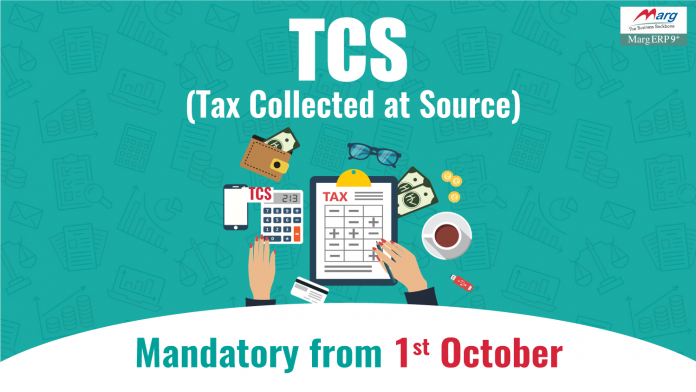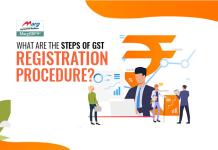In the recent amendments in Finance Act 2020, a new provision under Section 206C (1H) was introduced for the TCS Tax (Tax Collected at Source). The new amendment will be effective from 1st October 2020.
Article Content:
- What is TCS Tax?
- New TCS Tax Provision
- Who Is A Liable Seller In TCS?
- What Are The Goods Covered Under TCS Tax Provision?
- Different Rates Applicable Under Different Categories
- TCS Tax Filing Dates
- TCS Certificate
- TCS Exemptions
- TCS Tax Under GST
- Simple Example Of TCS Calculation
- Submission of Form 24G
- FAQ’s
What is TCS Tax?
TCS tax full form Tax Collected at Source is the form of tax payable by the seller, which the seller collects from the Buyer at the time of the sale. All the terms & conditions are governed by the Section 206C of Income-tax act.
New TCS Tax Provision
As per the new TCS tax provision, if any seller has an annual turnover more than Rs. 10 crores in the preceding Financial Year then he from 1st October 2020 he is liable to collect TCS tax at a rate of 0.1% (0.075% till 31.03.2021) from the buyer if the buyer purchases products exceeding Rs. 50 Lac. This 50 Lac limit will be observed for each buyer separately. In simple words, there will be no TCS tax liable to be collected from the buyer until he reaches a purchase of 50 Lac. The seller can only collect tax once the limit of Rs. 50 Lac is reached. As a grace period, the sale made to the buyer until 30 September 2020 shall not be included in the provision. All the sale till 30 September 2020 shall be exempted from any TCS tax. This rebate is given only for the first year of implementation.
Who is A Liable Seller In TCS Tax?
Seller: An individual or firm whose total sales including gross sales, turnover of his business exceed Rs. 10 Crore during the financial year preceding the year in which the sale was carried out. This sale does not include the sale of Services. Some specific individuals or organizations are classified as sellers for the TCS tax under income tax act. No other seller is liable to collect TCS tax.
Following are the categories of seller:
- Central Government
- State Government
- Local Authority
- Statutory Corporation or Authority
- Company registered under the Companies Act
- Partnership firms
- Co-operative Society
- Any person or HUF subjected to an audit of accounts under Income tax act
Buyer: An individual or an organisation which purchases any goods.
Below are the mentioned buyers who are liable to pay TCS tax:
- Public sector companies
- Central Government
- State Government
- Embassy of High commission
- Consulate and other Trade Representation of a Foreign Nation
- Sports clubs and social clubs
What Are The Goods Covered Under TCS Tax Provision?
TCS tax is only collected by the seller if the goods purchased are used for trading purpose. If the buyer uses the purchased goods for manufacturing process & producing things, then the TCS applicability rules, TCS tax is not liable. The TCS tax is collected by the seller at the time of selling.
Different Rates Applicable Under Different Categories
| Type of Goods | Rate |
| Alcohol & Liquor made for consumption by humans
Other consumable goods by humans |
1% |
| Timber wood under a forest | 2.5% |
| Tendu leaves | 5% |
| Timber wood by any other mode than forest leased | 2.5% |
| A forest produce other than Tendu leaves and timber | 2.5% |
| TCS on Scrap | 1% |
| Minerals like lignite, coal and iron ore | 1% |
| Exceeds over Rs. 2 lakhs/ Jewellery that exceeds over Rs. 5 lakhs | 1% |
| Purchase of Motor vehicle exceeding Rs. 10 Lakhs | 1% |
| Parking lot, Toll Plaza and Mining and Quarrying | 2% |
TCS Tax Filing Dates
| Collection Month | Quarter Ending | Due date of Payment | Due Date of filing return |
| April | 30th June | 7th May | 15th July |
| May | 7th June | ||
| June | 7th July | ||
| July | 30th September | 7th August | 15th October |
| August | 7th September | ||
| September | 7th October | ||
| October | 31st December | 7th November | 15th January |
| November | 7th December | ||
| December | 7th January | ||
| January | 31st March | 7th February | 15th May |
| February | 7th March | ||
| March | 7th April |
Note: All amount collected under TCS Tax by the government office shall be deposited of the same day of collection
- The seller has to deposit the TCS tax amount within 7 Days in the form of Challan 281 from the last day of the month tax was collected.
- It is important to note that if the taxpayer collected the tax & fails to deposit the tax on the above-mentioned due-dates then he is liable to pay 1% extra interest on the amount per month.
- Every seller/ tax collector has file Form 27EQ that is the Quarterly TCS return. The interest in the delay has to be paid before filing the TCS tax return to the government.
TCS Certificate
- A TCS Tax certificate need to provide to the buyer by the seller after filing the TCS Tax return i.e. Form 27EQ
- A certificate is also issued against the TCS Tax return filed which will contain the following details:
- Name of the Seller and Buyer
- TAN of the seller
- PAN of both seller and buyer
- Total tax collected by the seller
- Date of collection
- The rate of Tax applied
The due dates of issuing the TCS certificate are as follows
| Quarter Ending | Date of Issuing |
| Quarter ending on 30th June | 30th July |
| Quarter ending on 30th September | 30th October |
| Quarter ending on 31st December | 30th January |
| Quarter ending on 31st March | 30th May |
TCS Exemptions
As already mentioned in the following cases TCS Tax is not applicable:
- If the buyer uses the purchased goods for personal consumption
- If the buyer purchases the goods for manufacturing or production purpose & not for the trading purpose.
TCS Tax Under GST
- Any dealer selling goods on online platforms are liable for a 1% rate of TCS Tax under GST. This means the dealer would get the payment from online sources after deducting 1% TCS tax amount under GST. This is stated at 0.5% in CGST & 0.5% in SGCT in IGST Act
- 10th of every next month in the due date of filing TCS Tax rate in GST
- It is mandatory for all the dealers/ trader to register themselves as TCS Tax registration under GST
Let us understand TCS Tax calculation under GST with a simple example:
Mr Akshay(seller) is a dealer who sells electronics online on Amazon (buyer). He receives an order of 20,000 with Commission included. Then the amazon being the buyer here would give 19,800 deducting 1% i.e. Rs.200.
Submission of Form 24G
In the case of the Government Office, where tax has been paid to the credit of Central Government without the generation of a challan connected with the deposit of the tax in a bank, below are the new rules, that are applicable to Form 24G:
Rules for depositing TDS without challan (changes to Rule 30)
a. In case the TDS is deposited without a connected challan, then the responsible person to whom TDS has been reported has to submit a statement in Form 24G to the agency authorized by the Principal Director of income tax (systems). [Rule 30(4)].
b. Such Form 24G must be issued & submitted within 15 days from the month end of the relevant month. For example, for the month of April, the form should be submitted by 30 May 2019.
c. Form 24G must be submitted
(a) electronically under digital signature
(b) Electronic verification in Form 27A
(c) or verified through an electronic process
(d) Person to whom TDS has been reported must inform the Book Identification Number generated to each of the deductors
(e) The Principal Director General of Income Tax (Systems) shall specify the procedure for submitting & validating statement Form 24G.
Rules where TCS under section 206C is deposited without challan (changes to Rule 37CA)
a. In a case the TCS has been deposited without a challan, the person to whom the collector has reported the TCS for depositing to the government will submit Form 24G to the agency authorized by the Principal Director of income tax (systems).
b. Such Form 24G must be issued & submitted within 15 days from the month end of the relevant month. For example, for the month of April, the form should be submitted by 30 May 2019.
c. Form 24G must be submitted
(a) electronically under digital signature
(b) Electronic verification in Form 27A
(c) or verified through an electronic process
(d) Person to whom TDS has been reported must inform the Book Identification Number generated to each of the deductors
(e) The Principal Director General of Income Tax (Systems) shall specify the procedure for submitting & validating statement Form 24G.
This new amendment is mandatory from 1st October 2020.
With Marg ERP Software, the user can easily enable & collect TCS at the time of creating the Sale bill against the goods sold to different parties.
To Get TCS Ready Software; Contact us to get your Demo Now!
FAQ’s
[sp_easyaccordion id=”5465″]




















